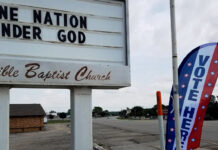
The conventional wisdom about the decision to drop atomic bombs on Hiroshima and Nagasaki is that even with the horrifying devastation that resulted from those bombs, it was necessary to force Japan’s surrender. Under this narrative, the only other option would have been an invasion of the Japanese home islands that would have cost more lives than what American public opinion would have been willing to tolerate. That’s the story we’ve been told in history classes for the better part of 70 years.
But as President Obama made his history-making trip to Hiroshima, I learned that just about everything we’ve been told about Hiroshima and Nagasaki isn’t just wrong, but–with apologies to Politifact–it’s Pants on Fire wrong. Back in 2015, Gar Alperovitz of The Nation stumbled on overwhelming historical evidence that shows Japan was already beaten well before the bombs were dropped–thus demolishing any legitimate basis for dropping them.
Alperovitz discussed his findings with Paul Jay of The Real News last year. Watch the interview here.
The folks at The Nation felt compelled to share this story on their Facebook page on Friday morning.
How do we know Japan had already lost? From the mouths of those in a position to know–America’s top commanders during World War II. Let’s start with the highest-ranking man in uniform at the time, Admiral William Leahy, the Chief of Staff to the Commander in Chief–forerunner of the Chairman of the Joint Chiefs–for the last three years of the war. In his memoir, “I Was There,” Leahy wrote that the use of the bomb was “of no material assistance” because Japan was “already defeated and ready to surrender.” Moreover, he felt that the use of such a “barbarous weapon” ran counter to everything he had been taught about combat, and represented “an ethical standard common to barbarians of the Dark Ages.”
General Henry Arnold, commander of the Army Air Forces, told The New York Times a mere 11 days after “Little Boy” fell on Hiroshima that even before then, Japan was in no position to continue the war because “the Japanese had lost control of their own air.” That’s what made the firebombing of Tokyo in March 1945, as well as the bombing of several other cities, possible. Arnold’s assessment is important, because if the Allies controlled the skies, it would have made it all but impossible for the Japanese to tie down an invasion force for long.
Fleet Admiral Chester Nimitz, commander of the Pacific Fleet, was equally blunt in a public speech at the Washington Monument two months after the bombings, in which he said they “played no decisive part” in ending the war. In 1946, Admiral William Halsey, commander of the Third Fleet, denounced the bombings as “an unnecessary experiment.” As he saw it, the men behind the Manhattan Project “had this toy and wanted to try it out”–and did so on Hiroshima and Nagasaki.
Major General Curtis LeMay, commander of the 21st Bomber Command–and best known as George Wallace’s running mate in 1968–said only a month after the bombings that they “had nothing to do with the end of the war at all.” Last, but certainly not least, Dwight Eisenhower wrote in his memoirs that he had “grave misgivings” about using an atomic bomb because Japan was “already defeated,” and thus such a weapon was “no longer mandatory as a measure to save American lives.” These weren’t just some cranks talking. These were six of the highest-ranking officers in this country’s history.
Further underlining this, the “Little Boy” exhibit at the United States Navy Museum explicitly states that the bombings “made little impact” on Japan. Indeed, the exhibit notes, Japan’s military commanders only came to their senses when the Soviet Union declared war against Japan two days after Hiroshima. They knew that it would be suicidal to hold out under the combined onslaught of an American invasion from the south and a Soviet invasion from the north. And yet, according to the exhibit, it was President Truman’s “political advisers” who ultimately made the final calls on how to end the war.
Until this weekend, I had believed that dropping atomic bombs on Hiroshima and Nagasaki was necessary to prevent our troops from being sent into a meat-grinder. But if the men who were actually on the ground were unanimous that Japan was already defeated, I stand corrected. Let’s not beat around the bush–using atomic bombs on Japan was wrong. Flat-out wrong.




